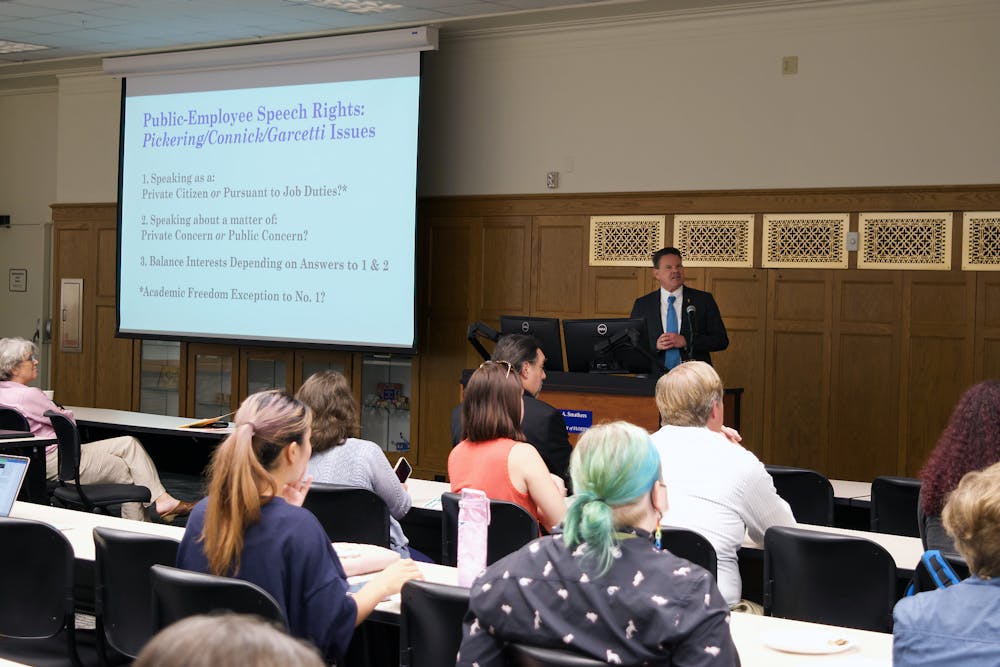Paul Oritz would like to be thanked instead of attacked for the courses he teaches.
At the UF Ethics in the Public Sphere’s “Pizza and Public Ethics” event Tuesday, the UF history professor spoke to over 40 listeners gathered in Smathers Library on the role of unionizing in protecting academic freedom. He was joined by Clay Calvert, former UF professor and director of the UF Law’s First Amendment Center.
Although it was UF faculty who kept the university running through a pandemic, Oritz said the state of Florida has responded to the hard work of public educators over the last three years, not by thanking them, but by creating legislation designed to attack academic freedom.
“It would be nice if for once the state said ‘thank you,’” Ortiz said. “‘Thank you, staff, for keeping this school running.’”
One piece of legislation referenced heavily during the presentation was Florida House Bill 7, or the “Stop W.O.K.E. Act,” which Gov. Ron DeSantis put into effect July 2022.
The bill outlines eight supposed concepts of critical race theory — the academic framework dating to the 1970s that presents racism in the US as a systemic issue — and prohibits public K-12 schools and universities from endorsing these concepts in the classroom. In November 2022, U.S. District Judge Mark Walker issued a temporary block against the bill in higher education settings.
UF spokesperson Cynthia Roldan said the university has nothing to add to the conversation of changing legislation as of Wednesday afternoon.
Walker’s ruling criticized the bill for its “viewpoint-based notion,” Calvert said.
“The state is allowed to select the topics that public universities teach,” Calvert said, “but once you have the topic, you can’t take sides and say some viewpoints and not others.”
Notably, he said the bill forbids instructors to “endorse” the tenets of CRT, but it leaves them free to “criticize” CRT. This inhibits not only the professors’ right to speak, but the students’ right to receive information, Calvert said.
“If you’re a student in a public university classroom…you have a right to receive all different viewpoints on these topics,” Calvert said. “Not just the ones that the government endorses.”
Ortiz, who is president of UF’s chapter of United Faculty of Florida — the union that represents over 25,000 faculty members at all twelve Florida public universities — used the event to emphasize the role of faculty unions in protecting academic freedom in public universities.
“[The collective bargaining agreement] is our protection for protecting academic freedom…in terms of teaching, research and service,” Oritz said.
A collective bargaining agreement is a written legal contract between an employer and a union, according to the Society for Human Resource Management. UF’s CBA places importance on academic freedom, in part because many of the union’s founders were refugees from political dictatorships in Latin America and Eastern Europe or descended from Holocaust victims from Nazi Germany, Ortiz said.
“Some of [the founders] were sons and daughters of Holocaust victims,” Oritz said, “so when they were conceiving and imagining what a CBA should look like, academic freedom was at the center.”
When the act was first passed, UFF’s state chapter released a “Classroom Guidance” notice to its members on navigating the prohibitions of the bill.
“The collective power enforced by a strong local CBA is the best defense any faculty member can have against the overreaching, totalitarian authority represented in this law,” the notice said.
Although he concurred with the power of the CBA, Ortiz also emphasized the CBA and the labor laws underpinning it will not matter unless union members come together to support and uphold it. Luckily, he said a surge of statewide and national support from Americans across the political spectrum is currently aiding the union’s fight for academic freedom.
“I feel like a rock star,” he said. “I’ve been in the labor movement since the late 1980s, and it’s rare to ever be in a labor struggle — and this is a labor struggle, in part — that is actually so popular and has so many people’s support.”
Kestrel Ward, staff member at UF’s Architecture and Fine Arts Library, attended the presentation and said she agrees with Oritz that unions act as a “line of defense” against restrictive legislation.
“Unions protect us,” Ward said. “They can pass laws all they want, but they still have to honor the collective bargaining agreement.”
Ward is a steering committee member of United Campus Workers UF, a staff and adjunct union at UF. Although UCW’s UF chapter is still in its beginning stages and doesn’t yet have a collective bargaining agreement, Ward said, the group has begun taking action by hosting meetings and educational events.
“Our organizing model is not to wait,” Ward said, “but to start advocating for staff as soon as possible.”
Phoebe Barron, a UF environmental engineering freshman, said she enjoyed the presentation because it gave her a better understanding of the legal mechanisms behind legislation.
Barron hopes to pursue a minor in religion studies, she said, but she worries that legislation like “Stop WOKE” will limit STEM students’ ability to pursue interdisciplinary interests. However, Barron was encouraged upon learning about the power of UF’s unions.
“To see that progress so quickly bodes well for the university,” Barron said.
April Hines, librarian for the College of Journalism and Communications, is part of the Ethics in Public Sphere working group responsible for organizing the event. The group planned the discussion on academic freedom because of the debates taking place on the topic across Florida, she said.
“There’s a lot of confusion, a lot of myths about what our rights actually are or aren’t,” said Hines. “It was good to have experts here to help clear that up.”
Hines, an active member of UFF, said while UF faculty are fighting for their rights to provide the quality education that students want and deserve, unions must play a role in the stance against attacks on academic freedom.
“Collective bargaining is the only true leverage we have,” Hines said. “It’s set by law that the university has to come to the bargaining table with us.”
Contact Zoey at zthomas@alligator.org.

Zoey is the Fall 2025 engagement managing editor of The Alligator. She has previously served as data editor and reported on the university, metro and enterprise desks. Over the summer, she interned for the Orlando Sentinel. Zoey inherited her mom's love of strong coffee and her dad's love of "Buffy the Vampire Slayer."






